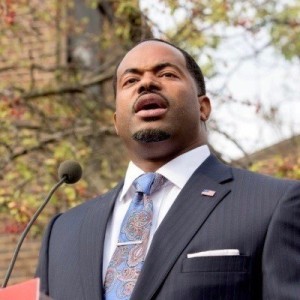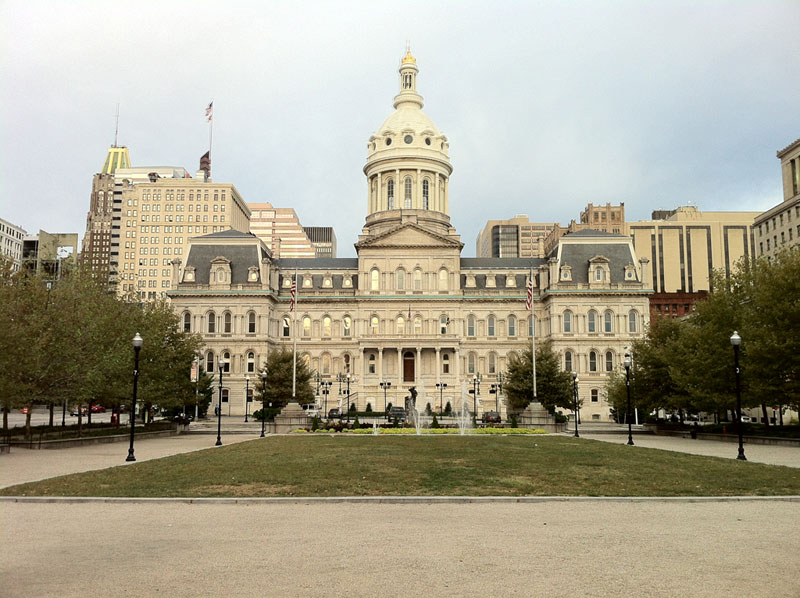Baltimore’s Democratic candidates for mayor see the city’s technology community as an important source of economic development, and a potential partner in driving change at City Hall.
That’s the top-level takeaway from a Technical.ly-curated questionnaire submitted to the Democratic mayoral candidates on behalf of Baltimore’s tech scene.
See the questionnaire
The Democratic primary, scheduled for April 26 (voter registration deadline is April 5), often decides the mayor’s race in a city where registered Democrats outnumber Republicans 9-1 (PDF).
On the 15 questions we submitted, there is broad consensus. We asked each candidate to respond either “Yes,” “No” or “Not yet determined” to explain their support for those issues. There wasn’t a single “No,” and only one outright “Not yet determined.” We learned more about each candidate’s plans at a forum held at Impact Hub Baltimore on Jan. 27, which you can watch here in its entirety.
Here’s what we learned, in alphabetical order:
###

Sheila Dixon answered Yes to all 15 questions. The former mayor included comments on the city’s conduit system, which recently made headlines after the underground utility network was identified by current Mayor Stephanie Rawlings-Blake’s task force as a key tech asset. BGE, which offered to buy the conduit, sued the city after its rate to use the system was tripled. Dixon pointed out that the current situation began during her term as mayor. During that time, the city also mapped the system, made repairs to ease access and installed security systems at key spots.
“I believe that the City’s conduit system is one of the greatest untapped economic development resources that our City has to offer high-tech firms considering Baltimore,” Dixon wrote. “Whether by creating our own broadband network or allowing others to do so, we must look for ways to leverage the conduit system in ways not previously considered.”
·

Elizabeth Embry answered Yes to all 15 questions. In comments, the former Chief Deputy Maryland Attorney General and prosecutor in the Baltimore City State’s Attorney’s office said she planned to release an economic development plan in February, and said Baltimore needed to make decisions to tap the knowledge economy.
She said the city needs “to make smart investments, ones that ensure that we are providing a platform including a digital backbone that can support the next generation of innovation in our city, and ensure that we bridge the digital divide for all of our citizens. Other cities are making these investments and choices, but Baltimore is falling behind.”
The daughter of Abell Foundation President Robert Embry also figured startups and broadband into her economic development plan. The release of the plan featured quotes from STAQ cofounder Mike Subelsky and Rowdy Orbit Impact’s Jorge Castillo.
·

Patrick Gutierrez answered Yes to 14 questions. He said his answer was “Not yet determined” on the question of retaining the role of Broadband Coordinator. He added that his “Yes” answers are “cornerstones” of his campaign. He said his administration would use technology to make city government more efficient and transparent, and he wants to work with the tech community to make that happen.
“The improvement in leadership and day-to-day management of the city that I will provide coupled with the improvement in technology will free up countless resources to address these issues in a manner that delivers results,” he said.
Gutierrez added that making the city safer, among other issues in the wider campaign, is key to helping Baltimore attract tech workers.
·
Nick Mosby answered yes to all 15 questions. In comments, the City Councilman wrote that his background informed his positions on tech.

“As a trained electrical engineer who has worked extensively in cloud storage and Internet technologies, I am keenly aware of the role that technology should play in spurring business and fiscal growth in Baltimore,” he wrote.
Mosby pointed to three tech-related planks from his wider 15-Point Plan for the city:
- Equipping police officers with body and dashboard cameras
- Creating a Mayor’s Office of Data and Analysis
- Developing a municipal, 1 gigabit fiberoptic network for citywide internet service
·
Catherine Pugh answered Yes to all 15 questions.

In her comments, the state senator pointed to her support for legislation that expanded broadband in Maryland, expanded telemedicine and included Morgan State University in the state’s research grant program.
“Data information policies lead to a more accountability in government and business. It will increase effectiveness and efficiency,” she wrote.
·
Carl Stokes answered Yes to all 15 questions. Tech issues figured heavily into Stokes’ economic development platform, which was released in early February.

In his plan for jobs, “Innovation Economy” is one of the main headers. The City Councilman’s plan focuses on establishing innovation hubs by supporting existing areas oriented toward startups such as Station North, East Baltimore, BioPark and Port Covington. He also calls for leveraging anchor institutions and encouraging those institutions to improve their surrounding neighborhoods.
“Baltimore stands to be a big winner if we can craft a coherent, compelling innovation strategy that frames policy decisions focused on targeted geographic areas around industry niches that build on local resources,” the plan states. “I fully support innovation concepts such as municipal broadband and City-wide high-speed internet service.”
Stokes also cited technology as a key to building a local workforce, citing the Digital Harbor Foundation and Code in the Schools.
·
David Warnock answered Yes to all 15 questions. At the forum and in the questionnaire, he drew on overall campaign goals of creating jobs, and making city government more transparent.

“To me, that means a renewed focus on customer service, serious commitment to real open data, a more open CitiStat program that is based on real, and not phony, data, and publicly posted goals for each city agency along with progress toward those goals,” he wrote.
Warnock also talked about his work funding tech companies at his investment firm Camden Partners, and making personal investments in startups.
“I’ve created hundreds of jobs that pay good, family-sustaining wages, and I know what it takes to help businesses scale,” he wrote.
·
Cindy Walsh was the only candidate to respond with a definitive “No” to several questions, saying she did not support retaining a Chief Data Officer, using data.baltimore.gov, using data tools such as APIs, delivering data in machine readable formats and supporting the role of private investment in civic growth. She was “Not yet determined” on police body cameras.

She also took issue with the questionnaire itself.
“Allowing only Yes and No answers shows how a social Democrat like Cindy Walsh has some problems with the stance promoted by Baltimore Tech Co and I do not feel it represents the expectations of many citizens in Baltimore,” she wrote.
In comments, she said the city’s conduit is the most critical tech issue, but wants to ensure the conduit remains public so it is not dominated by Baltimore’s biggest institutions and global corporations.
She does not support biotech labs, but will support small business. She supports tech labs in schools, but does not support apprenticeships. On open data, she said she does not support opening up data on transactions with citizens, but does support using it for transparency purposes and policymaking.
—
Technical.ly Baltimore will update this post if we receive responses from additional campaigns.







